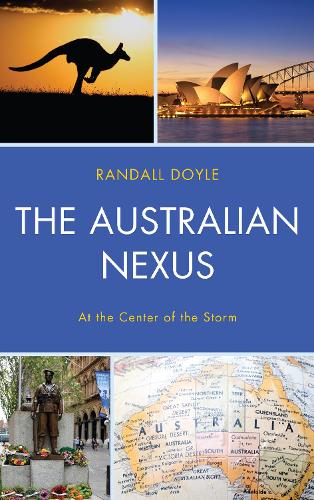
The Australian Nexus: At the Center of the Storm
(Hardback)
Publishing Details
The Australian Nexus: At the Center of the Storm
By (Author) Randall Doyle
Bloomsbury Publishing PLC
Lexington Books
18th June 2018
United States
Classifications
Professional and Scholarly
Non Fiction
327.94
Physical Properties
Hardback
166
Width 162mm, Height 233mm, Spine 19mm
540g
Description
In 2018, Australia finds itself at the center of a geopolitical storm within the Indo-Pacific region. With the meteoric rise of China and the perceived decline of U.S. influence and power in East Asia, Australia is faced with some rather difficult and uncomfortable questions concerning its economic future and its national security. Historically, Australia has always had a major power as its key ally, especially in terms of its national security. In 1901, Australia became a self-governing nation. However, Great Britain continued to protect Australia from potential external enemies, because Australia remained an important and valued commonwealth nation within the British empire. However, at the beginning of the Pacific War during WWII, Australia reached out to America after the British colony Singapore collapsed in the face of the oncoming and powerful Japanese imperial military forces in February 1942. With the empire of Japan marching southward in the Pacific region, Australian prime minister John Curtin anxiously requested, in late-December 1941, that America come save the nation from being invaded by the Japanese imperial army and naval forces. Due to its own strategic needs against Japan, the U.S. agreed to send its military forces to Australia. Thus, began a geostrategic relationship that has lasted for seventy-five years. Hence, Australia has remained one of America's most reliable allies throughout the post-WWII era. But, at the end of the second decade of the 21st century, the geostrategic dynamics of the Indo-Pacific have changed dramatically. China's unprecedented rise to power economically, militarily and diplomaticallyhas forced Australia to reevaluate its policies and position within the East Asian hemisphere. And, to further complicate Australia's current predicament, America itself is experiencing a major political upheaval with the stunning election of Donald Trump as its new president in 2016. Henceforth, Australia increasingly finds itself in uncharted watersgeopolitically. Australians are confronted with the irrefutable reality that they are living not only in the most pivotal region of the world, but one that is in the midst of an historic transformation. In essence, Australia finds itself at the center of a geostrategic storm.
Reviews
Dr. Randall Doyle, a prolific author, offers a new monograph on Australias importance in the shaping of the complicated international relations in the Indo-Pacific region. By using voluminous sources, personal experience, and eloquent language, he highlights Australias heritage from Britain, stresses Australian alliance with the United States of America, and underscores Australias relationship with other regional powers. Although Australia was silent in the past as a British colony and then a British dependency and in the recent decades as an American ally under U.S. paternalism, the country now is a rising nation. Its rich natural resources and its strategic position determine the fate of the nation as a regional power. As Doyle argues, Australia is posited in the center of storm as it will continue to play an important role in 21st century global and regional affairs, in particular, in the Indo-Pacific region. Doyle has written this book with his easy-to-understand language, while offering funny stories and rendering quick-witted remarks. -- Patrick Shan, Grand Valley State University
Dr. Doyle has once again demonstrated his considerable ability to boil the Asia-Pacific region down to its essential motivations. There are few teachers and practitioners working today whove spent more time thinking about Australia. In The Australian Nexus Dr. Doyle shows clearly why the worlds sixth largest country over twice as large as its neighbor India is emerging as one of the regions most important actors in this century. His portrait is at once alarming and hopeful, accurately portraying todays tensions but also considering how regional and global powers might win the western Pacific. -- Micah Watson
Author Bio
Randall Doyle is adjunct professor of history and government at Mid Michigan College.
